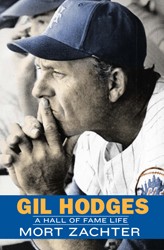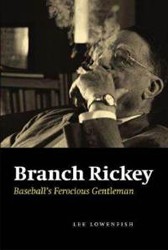Mort Zachter is the author of the recently published book Gil Hodges: A Hall of Fame Life. Today he writes for the Jewish Book Council about why he, a Jewish man, chose to write about a devout Catholic.
 I’m often asked why I wrote a biography of Gil Hodges. Why not someone Jewish?
I’m often asked why I wrote a biography of Gil Hodges. Why not someone Jewish?
“I grew up in Brooklyn, just a couple of blocks from where Hodges lived on Bedford Avenue. He was my childhood hero.”
But that’s just a sound bite. The real answer, the one that sustained me through the many years it took me to see the project through from inception to publication, this I can tell you in one word: anivut.
In the Torah it is written, Ve’ha-ish Mosheh anav me’od mi-kol ha-adam asher al p’nei ha-adamah, “And the man Moses was a very humble man, more so than any other man on earth.”
The Hebrew word anav refers to anivut or humility. For Moses, the word did not necessarily mean self-deprecation, but rather self-restraint. Rabbi Chaim Volozhin the founder of one of the most influential yeshivas in Eastern Europe in the nineteenth century, wrote that to be anivut, “does not mean an untruthful lack of appreciation of one’s self and one’s attainments, but rather a lack of arrogance. To be anav means to recognize your true worth, but not to impose the consequences upon your friends and neighbors. It means to appreciate your own talents, neither over-emphasizing nor underselling them, but at the same time refraining from making others aware of your virtues at all times.”
In 1964, Gil Hodges was the manager of Washington Senators. They lost 100 games that year. Their roster was largely composed of mediocre players who rarely, if ever, had a moment of glory in which their accomplishments brought them accolades. But on June 8, 1964, a journeyman outfielder named Jim King had the game of his life. Although the Senators lost that day, King hit three home runs in that one game, an unusual feat accomplished by only a few hundred players in baseball history.
After the game, the press flocked to King. Photos showed him smiling broadly, enjoying his moment in the sun. After a Senators’ game, the press normally converged upon Hodges. As a former star player, he was the face of the team. But that day, Hodges was an afterthought. After the game, someone asked Hodges if he ever hit three home runs in one game? He simply said he was “not in the record books” for that one. And he didn’t say anything more.
Washington Post writer Bob Addie overheard Hodges and decided to do some research. In his column the next day, Addie wrote that he learned that fewer than ten major league players had ever hit four home runs in a single nine-inning game. The list included some of games’ all-time greats, Lou Gehrig, Willie Mays, and the man that brought Addie to the list in the first place, a man who was not Jewish, but who was anivut, Gil Hodges.
Mort Zachter was a struggling tax attorney /CPA and adjunct tax professor until he discovered the fodder for his first book, Dough: A Memoir. Based on a shocking family secret — that he was a second generation millionaire — the story won him the 2006 AWP Prize for Creative Nonfiction and was published in 2007. Zachter’s new book is focused not on his childhood experiences, but on a childhood hero of his and so many other Brooklyn natives: Gil Hodges: A Hall of Fame Life (University of Nebraska Press). Zachter lives in Princeton, NJ. Learn more at www.mortzachter.com.
Related Content:
- Reading List: Jews and Baseball
- We Missed These Jewish Jocks. Do You Know Them? by Marc Tracy
- Dough: A Memoir by Mort Zachter
A Brooklyn-born CPA and tax lawyer turned Pushcart Prize-nominated writer, Mort Zachter is the author of Dough: A Memoir, winner of the AWP Prize for creative nonfiction. He lives in Princeton, NJ.



